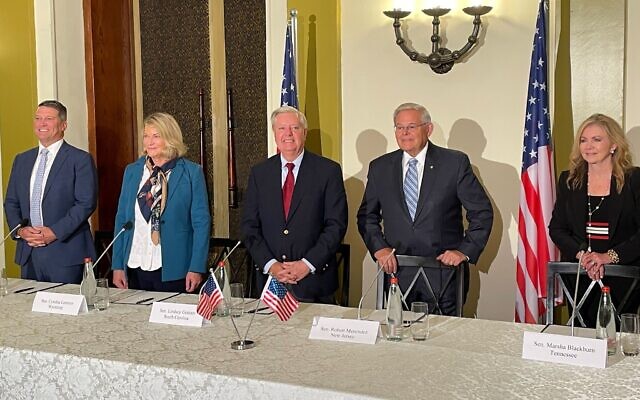Opposition leader Benjamin Netanyahu sought to film and record a closed-door meeting with visiting US senators and diplomats this week, but was told by the American officials to shut off the equipment if he wanted the meeting to proceed, according to a report Wednesday.
Two unnamed individuals familiar with Monday’s incident told Walla news that the group of Democratic and Republican senators, as well as US Ambassador to Israel Tom Nides, entered the room for a meeting that was expected to touch on the potential nuclear deal with Iran.
When they came in, they saw a member of Netanyahu’s staff activate a videocamera.
Nides also noticed a small microphone attached to Netanyahu’s jacket, and asked the former prime minister why he was wearing the device.
Netanyahu attempted to brush off Nides’s question, answering “it’s nothing,” the report said.
by email and never miss our top stories
According to the sources, Senator Lindsey Graham demanded that all recording devices be removed from the room before the meeting could begin.

It is not clear why Netanyahu sought to record the meeting, but he has in recent weeks increased his public protest against a potential nuclear deal, and Walla speculated he may have been seeking video content for his campaign.
מסיים פגישה חשובה עם חבריי הטובים, הסנאטורים לינדזי גראהם ובוב מננדז, שהגיעו לישראל בראש משלחת דו-מפלגתית של סנאטורים וחברי קונגרס. ???????????????? pic.twitter.com/pNIVbWzRd1
— Benjamin Netanyahu (@netanyahu) September 5, 2022
Netanyahu’s office played down the incident, telling Walla that as a matter of protocol all meetings with the former prime minister are documented, and insisting “there was no drama” at the meeting. “The request was honored and the camera was removed.”

The American group was part of a bipartisan senate delegation to Israel, which is being led by Senator Graham of South Carolina (Republican), and includes Republican senators Cindy Hyde-Smith of Mississippi, Marsha Blackburn of Tennessee, Cynthia Lummis of Wyoming, Representative Ronny Jackson of Texas, as well as Senate Foreign Relations Committee Robert Menendez, a Democrat.
The visit came amid fears amongst Israeli officials over the looming Iran nuclear deal.
On Wednesday, The Times of Israel’s Hebrew sister site Zman Yisrael reported that the deal is likely off the table after Iran made new demands Washington refuses to accept.
The nuclear agreement that has been negotiated on since Biden entered the White House in January 2021 focused on removing sanctions on Iran in exchange for limiting Tehran’s ability to reach the capability to build a nuclear weapon.
Times of Israel staff contributed to this report.

As The Times of Israel’s political correspondent, I spend my days in the Knesset trenches, speaking with politicians and advisers to understand their plans, goals and motivations.
I’m proud of our coverage of this government’s plans to overhaul the judiciary, including the political and social discontent that underpins the proposed changes and the intense public backlash against the shakeup.
Your support through The Times of Israel Community helps us continue to keep readers across the world properly informed during this tumultuous time. Have you appreciated our coverage in past months? If so, please join the ToI Community today.
~ Carrie Keller-Lynn, Political Correspondent
Yes, I’ll join
Yes, I’ll join
Already a member? Sign in to stop seeing this

We’re really pleased that you’ve read X Times of Israel articles in the past month.
That’s why we started the Times of Israel eleven years ago – to provide discerning readers like you with must-read coverage of Israel and the Jewish world.
So now we have a request. Unlike other news outlets, we haven’t put up a paywall. But as the journalism we do is costly, we invite readers for whom The Times of Israel has become important to help support our work by joining The Times of Israel Community.
For as little as $6 a month you can help support our quality journalism while enjoying The Times of Israel AD-FREE, as well as accessing exclusive content available only to Times of Israel Community members.
Thank you,
David Horovitz, Founding Editor of The Times of Israel
Join Our Community
Join Our Community
Already a member? Sign in to stop seeing this
